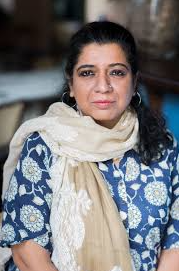
The Darjeeling Express chef discusses her journey into cooking, family traditions, and her latest culinary project.
Asma Khan has always believed that food offers a way to reconnect with one’s roots, a sentiment that has become even more significant as she explores her Indian heritage through her cooking. The celebrated chef behind Darjeeling Express has released a new cookbook dedicated to her mother, a reflection on family, memory, and the power of home-cooked meals.
Khan’s journey into the kitchen came unexpectedly. She never had a desire to cook as a child – “I just wanted to eat,” she shares with a laugh. Growing up in India, she thought cooking would always be a part of someone else’s responsibilities, especially within the context of her arranged marriage. However, when she found herself in the UK after her marriage, her perspective shifted dramatically.
“I was suddenly in a foreign land with a stranger,” Khan explains. Cooking became her emotional anchor – “Food became my way of going home, but it also became my language of love.” Her connection to her mother, Ammu, and her Indian heritage grew stronger as she learned to prepare traditional dishes. It wasn’t simply about learning how to cook but about healing, nourishing, and creating a connection to the life she left behind.
Through the process of writing her cookbook, Khan discovered the parallels between herself and her mother. “She changed things around her very gently… she was very unusual for her time,” Khan reflects, recalling her mother’s resilience and her efforts to support abandoned women and their children through food entrepreneurship. Her mother’s belief in empowering women through opportunity resonates in Khan’s own vision for Darjeeling Express, where she leads an all-female team of chefs.
Since opening her London restaurant in 2017, Khan has become a well-known advocate for diversity in the culinary world. As the first British chef to appear on Netflix’s Chef’s Table, she has used her platform to challenge the norms of representation and create opportunities for women. “Representation matters,” she says. “If there’s no chair at the table, take a chair and sit down.”
Khan is passionate about sharing her culture through food, but she is also clear about respecting its origins. She encourages anyone to cook her recipes, provided they take the time to learn the stories behind them. “Understand the region, understand the stories… some part of you will be honouring the women and generations from which this recipe has come down.”
Her philosophy on cooking focuses on generosity, time, and tradition. “The most expensive ingredient you put into a dish is time,” Khan explains. “Healing and nourishing have always been at the heart of how I cook.”
Asma Khan’s story, and her new cookbook, are reminders that food is far more than sustenance. It is a bridge to history, memory, and home – an act of love and connection shared across generations and borders.












